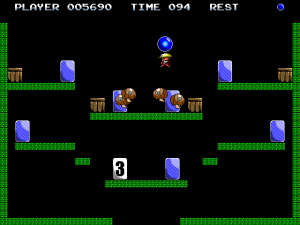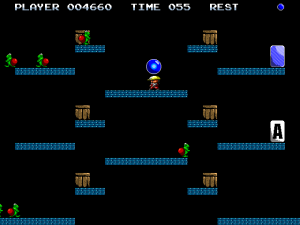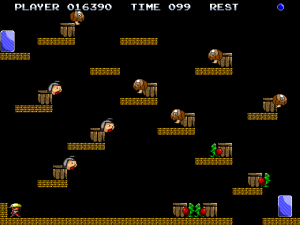Official Site (Japanese) || Freem Page || Game Jolt Page
Yokai Memory is the only game I can think of which attempts to combine memory matching with fast arcade-style platforming and the result is surprisingly successful. This is definitely an arcade platformer first and a matching game second, though the matching element is far from insignificant. Though this is a game by a Japanese developer, there isn’t much to worry about in terms of translation issues as this is not at all a text-heavy game and, aside from the title screen, all of the text is in English. Yokai Memory is, overall, a very simple, very challenging game so let’s start by focusing on the most important part, the gameplay.
 Many arcade games revolve around collecting items to clear a stage and this one is no exception. However, the difference here comes from the fact that the collectibles in question are giant cards which must be collected in pairs. Walking up to a card and pressing up will not only flip the card over to reveal its face, but it will also give the protagonist his weapon, a large blue orb; we’ll come back to this weapon momentarily, but for now I’ll focus on the cards themselves. If you ignore the platforming elements, the cards work the way they do in just about any other memory matching game – cards come in pairs and flipping over two cards in a row of the same value will cause the cards to disappear while flipping over an incorrect match will turn both cards back to being face-down. Exactly which card is in which position is randomized each playthrough, but the locations of the cards themselves are set in stone. Cards also only ever come in pairs and always start with Aces, represented by giant A’s, and count upwards from there. In other words, a stage with six cards will always have two Aces, two 2’s, and two 3’s, though you won’t know which card is which until you start flipping them over. As Yokai Memory does not give you a preview of the cards in advance, the start of a stage is always a careful balancing act between rushing to learn the locations of as many cards as possible while taking care to avoid getting hit in the process.
Many arcade games revolve around collecting items to clear a stage and this one is no exception. However, the difference here comes from the fact that the collectibles in question are giant cards which must be collected in pairs. Walking up to a card and pressing up will not only flip the card over to reveal its face, but it will also give the protagonist his weapon, a large blue orb; we’ll come back to this weapon momentarily, but for now I’ll focus on the cards themselves. If you ignore the platforming elements, the cards work the way they do in just about any other memory matching game – cards come in pairs and flipping over two cards in a row of the same value will cause the cards to disappear while flipping over an incorrect match will turn both cards back to being face-down. Exactly which card is in which position is randomized each playthrough, but the locations of the cards themselves are set in stone. Cards also only ever come in pairs and always start with Aces, represented by giant A’s, and count upwards from there. In other words, a stage with six cards will always have two Aces, two 2’s, and two 3’s, though you won’t know which card is which until you start flipping them over. As Yokai Memory does not give you a preview of the cards in advance, the start of a stage is always a careful balancing act between rushing to learn the locations of as many cards as possible while taking care to avoid getting hit in the process.
The platforming side of things is relatively standard, but the matching system ends up having a significant impact. Every stage is a single screen and both the player and the various yokai enemies can loop around it horizontally and vertically. You start with six lives and you have a good amount of invincibility time after you lose a life, but you still die in one hit and, as there are no continues, you can expect to get more than a few Game Overs (I’ve only ever been able to get up to Stage 11 personally).
 Where things get tricky is with your weapon, that blue orb I mentioned a while back, and, more specifically, with how it is acquired. The protagonist carries the orb above his head and at any point you can have him throw it in a straight line forward to temporarily kill enemies. The orb also loops around the screen just like the player and enemies can and it will reverse direction when it bumps against a wall so you can often clear out a significant chunk of the enemies with a single good toss. Though it is a powerful weapon, the orb does disappear very quickly and this is where the cards come in. Enemies become harder to deal with as you become closer to finishing a stage because the only way to obtain your weapon is to flip over a card and cards disappear as you successfully match them. Furthermore, you will likely want to be conservative with actually using your weapon as you may otherwise be caught in a position where you deliberately make in incorrect match just to get the weapon back to avoid taking a hit. As your weapon relies upon the existence of the very objects you are trying to collect, it becomes crucial to not only learn which cards are where, but to also plan out a general route to take through each stage so as not to be caught without your weapon. Of course, there is always a very tempting bonus of 10,000 points (the equivalent of 100 kills) for getting through a stage without killing any enemies at all, but only the most skilled players are likely to get this bonus without losing lives in any stage beyond the first handful.
Where things get tricky is with your weapon, that blue orb I mentioned a while back, and, more specifically, with how it is acquired. The protagonist carries the orb above his head and at any point you can have him throw it in a straight line forward to temporarily kill enemies. The orb also loops around the screen just like the player and enemies can and it will reverse direction when it bumps against a wall so you can often clear out a significant chunk of the enemies with a single good toss. Though it is a powerful weapon, the orb does disappear very quickly and this is where the cards come in. Enemies become harder to deal with as you become closer to finishing a stage because the only way to obtain your weapon is to flip over a card and cards disappear as you successfully match them. Furthermore, you will likely want to be conservative with actually using your weapon as you may otherwise be caught in a position where you deliberately make in incorrect match just to get the weapon back to avoid taking a hit. As your weapon relies upon the existence of the very objects you are trying to collect, it becomes crucial to not only learn which cards are where, but to also plan out a general route to take through each stage so as not to be caught without your weapon. Of course, there is always a very tempting bonus of 10,000 points (the equivalent of 100 kills) for getting through a stage without killing any enemies at all, but only the most skilled players are likely to get this bonus without losing lives in any stage beyond the first handful.
Yokai Memory has a good amount of 80s charm to it as well, though it is not entirely without its faults. Graphics are deliberately kept sparse and simplistic, but they serve to capture the intended aesthetic and short, Pac-Man-inspired cutscenes after every third level give a degree of character to the protagonist and the enemies. The actual music used is almost certainly not something the average 80s arcade cabinet would be capable of producing, but it nevertheless fits the game quite well. Unfortunately, despite its overall devotion to old arcade games in terms of both gameplay and aesthetics, Yokai Memory does not, to the best of my knowledge, actually keep track of high scores, making the various bonuses feel remarkably pointless beyond potentially granting extra lives.
 Yokai Memory falters a bit more severely in how enemies fall and respawn. Though some unpredictability is good, such as with the identities of the various cards, enemies can at times become a bit too unpredictable as they sometimes change direction while falling. Enemies outright plummet the moment they step off of a platform, but there are already usually so many enemies in any given stage that it is already tricky to keep track of them and needing to worry about if an enemy will start walking left or right after it lands on a platform is a bit much; consistent enemy movement is a golden rule in many actual arcade games, such as in Donkey Kong and the original Mario Bros., so the somewhat inconsistent movement found here feels like an odd decision and one which does not benefit the gameplay. As for respawning, enemies will respawn shortly after being killed at one of any number of doors placed around a stage and this in itself is fine. What is decidedly less than fine is how enemies will appear almost at the exact same moment as the animation for a door opening, giving the player no real opportunity to get away from them in time. Though it may not be deliberate, this respawn system feels like it actively punishes the player for attacking as any door can suddenly become a death trap until the defeated enemies reappear.
Yokai Memory falters a bit more severely in how enemies fall and respawn. Though some unpredictability is good, such as with the identities of the various cards, enemies can at times become a bit too unpredictable as they sometimes change direction while falling. Enemies outright plummet the moment they step off of a platform, but there are already usually so many enemies in any given stage that it is already tricky to keep track of them and needing to worry about if an enemy will start walking left or right after it lands on a platform is a bit much; consistent enemy movement is a golden rule in many actual arcade games, such as in Donkey Kong and the original Mario Bros., so the somewhat inconsistent movement found here feels like an odd decision and one which does not benefit the gameplay. As for respawning, enemies will respawn shortly after being killed at one of any number of doors placed around a stage and this in itself is fine. What is decidedly less than fine is how enemies will appear almost at the exact same moment as the animation for a door opening, giving the player no real opportunity to get away from them in time. Though it may not be deliberate, this respawn system feels like it actively punishes the player for attacking as any door can suddenly become a death trap until the defeated enemies reappear.
The lack of even a local high score list is disappointing and the way enemies respawn and handle movement after falling can be outright frustrating at times, but these issues are not even to prevent Yokai Memory from feeling like an arcade classic. Fans of retro platformers looking for a game with a few unique twists on the tried-and-true formula should definitely give this one a try.